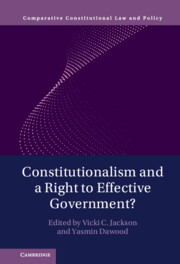Book contents
- Constitutionalism and a Right to Effective Government?
- Comparative Constitutional Law and Policy
- Constitutionalism and a Right to Effective Government?
- Copyright page
- Dedication
- Contents
- Tables
- Contributors
- Acknowledgments
- Part I Introduction
- Part II What Are Constitutions For?
- Part III Positive Rights and Rights to Effective Self-Government
- Part IV The Role of Courts in Building State Capacity and Promoting Effective Self-Government While Protecting Rights
- Part V Executive and Administrative Constitutionalism in Effective Democratic Government
- Part VI Legislatures, Representation, and Duties of Effective Self-Government
- 14 Legislatures and Effective Government: Raising Expectations for Representatives
- 15 Constitutional Directives and the Duty to Govern Well
- 16 Recursive Representation
- Part VII Politics, Sociology, Media, and Corruption as Contexts for Constitutionalism and Governance
- Index
16 - Recursive Representation
The Basic Idea
from Part VI - Legislatures, Representation, and Duties of Effective Self-Government
Published online by Cambridge University Press: 20 October 2022
- Constitutionalism and a Right to Effective Government?
- Comparative Constitutional Law and Policy
- Constitutionalism and a Right to Effective Government?
- Copyright page
- Dedication
- Contents
- Tables
- Contributors
- Acknowledgments
- Part I Introduction
- Part II What Are Constitutions For?
- Part III Positive Rights and Rights to Effective Self-Government
- Part IV The Role of Courts in Building State Capacity and Promoting Effective Self-Government While Protecting Rights
- Part V Executive and Administrative Constitutionalism in Effective Democratic Government
- Part VI Legislatures, Representation, and Duties of Effective Self-Government
- 14 Legislatures and Effective Government: Raising Expectations for Representatives
- 15 Constitutional Directives and the Duty to Govern Well
- 16 Recursive Representation
- Part VII Politics, Sociology, Media, and Corruption as Contexts for Constitutionalism and Governance
- Index
Summary
Today we face a long-run crisis of democratic legitimacy. Our increasing human interdependence is steadily increasing the numbers of “collective action,” or “free-rider” problems. Those problems in turn require increasing amounts of state coercion. Yet, in part precisely because state coercion is growing, that coercion is becoming less legitimate. As the demand for legitimacy increases and the supply decreases, every ounce of legitimacy becomes more precious.
A long-run response to this crisis requires many changes, including major restructuring to decrease inequality.
A relatively modest, but perhaps practicable and far-reaching, change in our thinking would make recursivity, meaning mutually responsive and iterated communication between representatives and constituents, more central to both the ideals and the practices of the representative system. In the aspirational ideal of recursive representation, representatives in the legislative, administrative, and societal realms engage in ongoing back-and-forth communication with their constituents. That recursivity allows each party to listen and learn, facilitating mutual influence and mutual adjustment. Because the process is more respectful of each citizen than the current system, the outcomes are more likely to reflect citizens’ needs. The resulting coercion should be both more defensible normatively and experienced as more legitimate.
Keywords
- Type
- Chapter
- Information
- Constitutionalism and a Right to Effective Government? , pp. 206 - 220Publisher: Cambridge University PressPrint publication year: 2022



